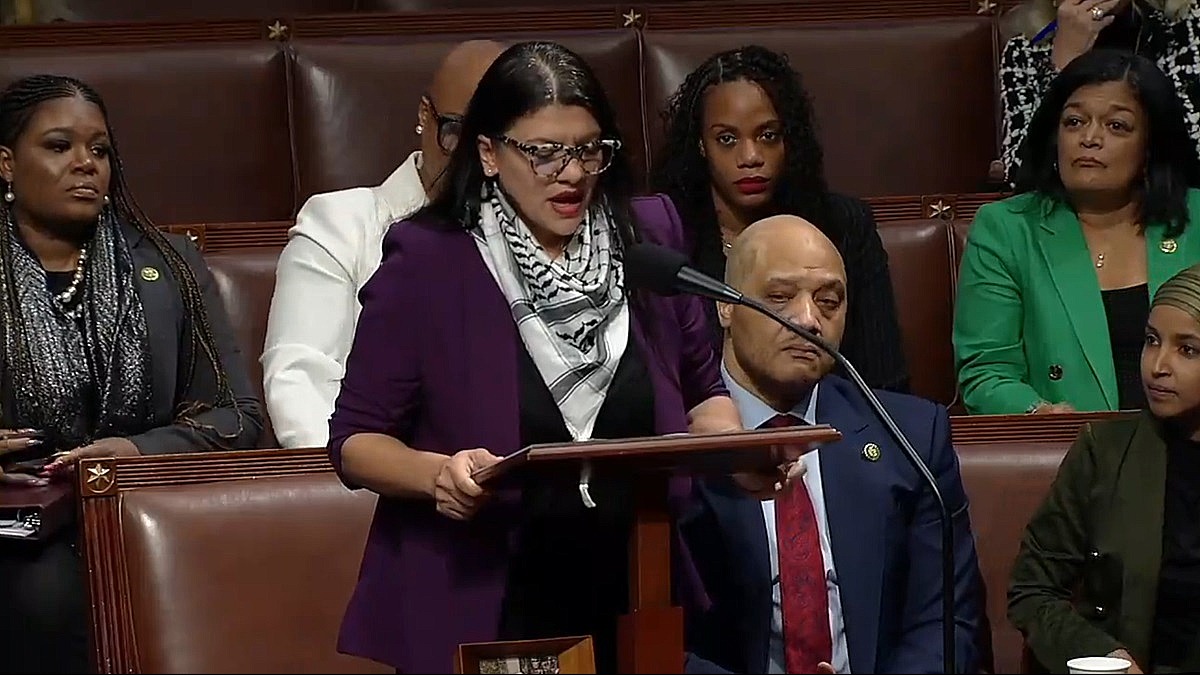Censorship within a democratic society like the United States, where freedom of speech is enshrined in the First Amendment, has again come into focus. The Republican Party’s decision to censor Michigan’s Congresswoman Rashida Tlaib brings to light questions about the boundaries of free expression in the House of Representatives.
Censoring a legislator, often orchestrated by the majority party, constitutes an official action taken within the legislative body. This measure serves to reprimand or condemn a member for their actions, statements, or conduct, and it encompasses actions like formal censures, committee assignment removal, and even potential expulsion. While rarely employed, this form of censorship is vital in maintaining order and discipline in the legislative arena.
The reason behind Representative Rashida Tlaib’s censoring was her use of the phrase “from the river to the sea.” This expression is at the heart of a contentious debate surrounding Israel and Palestine. Critics argue that it is a call for violence against Israel. At the same time, she contends it’s “an aspirational call for freedom, human rights, and peaceful coexistence, not death, destruction, or hate.” This distinction highlights the complexities of interpreting political rhetoric and the delicate balance between criticism and incitement.
Tlaib, the only Palestinian American serving in Congress, defended her perspective, asserting that having diverse voices is essential. She expressed her determination not to be silenced, emphasizing her commitment to speaking truth to power, drawing inspiration from her roots in Detroit.
In the United States, the First Amendment to the Constitution is cherished as a cornerstone of democracy. It guarantees the freedom of speech, religion, and the press. However, the question arises whether Congresswoman Tlaib, like any other elected official, has the right to freedom of speech and expression without fear of censorship.
The controversy around Tlaib’s statements reveals a larger issue in American politics. While freedom of speech is fervently advocated, it appears that those critical of Israel often face accusations of anti-Semitism. This reaction can lead to calls for censoring or silencing individuals despite their constitutional rights.
The question then becomes: Why is criticism of Israel often met with accusations of anti-Semitism or calls for censorship? It’s essential to recognize that having a different opinion about a foreign government’s actions should not equate to hatred or anti-Semitism. The principles of free speech apply to all Americans, regardless of their stance on international issues.
It’s crucial to examine the selective application of freedom of speech within the context of U.S. politics. While both Republicans and Democrats champion the First Amendment, the willingness to protect freedom of speech seems to vary based on the issue at hand. The controversy surrounding Congresswoman Tlaib’s censoring raises questions about the consistency and impartiality of applying this fundamental right.
In the hallowed halls of Congress, the world has witnessed members utter degrading, racial, and homophobic remarks without facing similar consequences. This selective approach to censorship erodes the principles of democracy and fairness in governance.
The Israeli-Palestinian conflict is a highly complex and contentious issue. Many argue that the situation in the Middle East should not be as complicated as it seems. The loss of innocent lives, including men, women, and children, on both sides of the conflict is a stark reminder that there must be a better way to address the long-standing hostilities.
The conditions in Gaza, often referred to as an open-air prison by the United Nations, require a change. Israeli Prime Minister Benjamin Netanyahu’s comments about occupying the Gaza Strip for an “indefinite period” have stirred international condemnation. Former Greek Finance Minister Yanis Varoufakis pointed out that this policy violates the Geneva Convention and may constitute a war crime.
The aftermath of the conflict has seen numerous world leaders and organizations call for Prime Minister Netanyahu to be charged with war crimes. His statement about occupying Gaza has been likened to genocide and ethnic cleansing by many.
While the Biden administration states its disapproval of Israel’s occupation of Gaza, its unwavering support for the nation, particularly in terms of military assistance, raises questions about the sincerity of this stance. Many nations and organizations advocate for a complete weapons embargo in the region to put an end to the cycle of violence and protect civilians.
The situation in Gaza has drawn comparisons to Russia’s annexation of Crimea and other parts of Ukraine. While Israel claims not to have occupied Gaza since 2005, military factions and checkpoints have still existed. However, the UN has stated, “apartheid is being practiced by Israel in the occupied Palestinian territory.” This ongoing conflict and occupation highlight the need for a comprehensive and lasting solution.
Returning to censoring Congresswoman Rashida Tlaib, it is evident that the issue extends far beyond her case. It challenges our understanding of freedom of speech, the right to criticize foreign governments and the consistency of applying these principles. In a democratic society, we must consider whether censoring those with differing opinions and a desire for peace is right.
As a society, we must reflect on why we censor individuals who advocate for peace and criticize foreign policies. The fundamental principles of freedom of speech and expression are the bedrock of any democracy, and safeguarding these rights, even in the face of controversial opinions, is crucial. It is an opportunity for us to question our moral compass and ensure that we do not compromise the rights of others to elevate ourselves.









